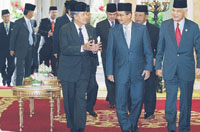 The role of the Rulers within the framework of the Federal Constitution is manifold. There are instances where they act on advice, where they have a discretion, and where they (the Conference of Rulers) are consulted (as in the appointments of the Chief Justice, Chief Judges of the High Courts and the Auditor General, to name a few). We have also seen in many instances the important advisory role they have played, and the moderating influence they have had in decision-making processes.
The role of the Rulers within the framework of the Federal Constitution is manifold. There are instances where they act on advice, where they have a discretion, and where they (the Conference of Rulers) are consulted (as in the appointments of the Chief Justice, Chief Judges of the High Courts and the Auditor General, to name a few). We have also seen in many instances the important advisory role they have played, and the moderating influence they have had in decision-making processes.
Even in instances where the Yang di-Pertuan Agong acts on the advice of the Cabinet or of a Minister, he is entitled to any information that he requests concerning the government of the Federation which is available to the Cabinet. In fact the Rulers provide an important check and balance in the many situations envisioned in our Federal Constitution. The State Enactments are also clear on the role of the Ruler particularly as Head of the Religion of Islam in their respective States. (In the case of Malacca, Penang, Sabah, Sarawak and the Federal Territories the Yang di-Pertuan Agong is head of the Religion of Islam).
Apart from the cold print of the Federal and State Constitutions, there are conventions built up over time that operate, and that may vary from state to state.
The position and influence of the Rulers is built as much on the deference and respect accorded to them by all Malaysians, as it is on the provisions of the Federal Constitution, State Constitutions and conventions. The Yang di-Pertuan Agong is in fact seen as a symbol of unity amongst the multi-racial, multi-cultural people of Malaysia.
Given the results of the recent general elections, however, it is unsurprising that issues have arisen that have brought to the fore debates on the scope and powers of the Rulers in the government of the State. Indeed, different views have been aired in the recent past concerning the events in Terengganu and Kedah.
Now it appears that only Mr Karpal Singh is being threatened with a charge for participating in such a debate. Apart from the other demerits of the Sedition Act and of proceedings under it, the move against Karpal is unacceptable, more so when there is a lack of similar action against others who have exercised their freedom of expression in quite the same manner as Karpal has.
The Bar Council urges the authorities to exercise restraint in relation to their proposed action against Karpal Singh.
Dato’ Ambiga Sreenevasan
President
Malaysian Bar
14 May 2008


No comments:
Post a Comment